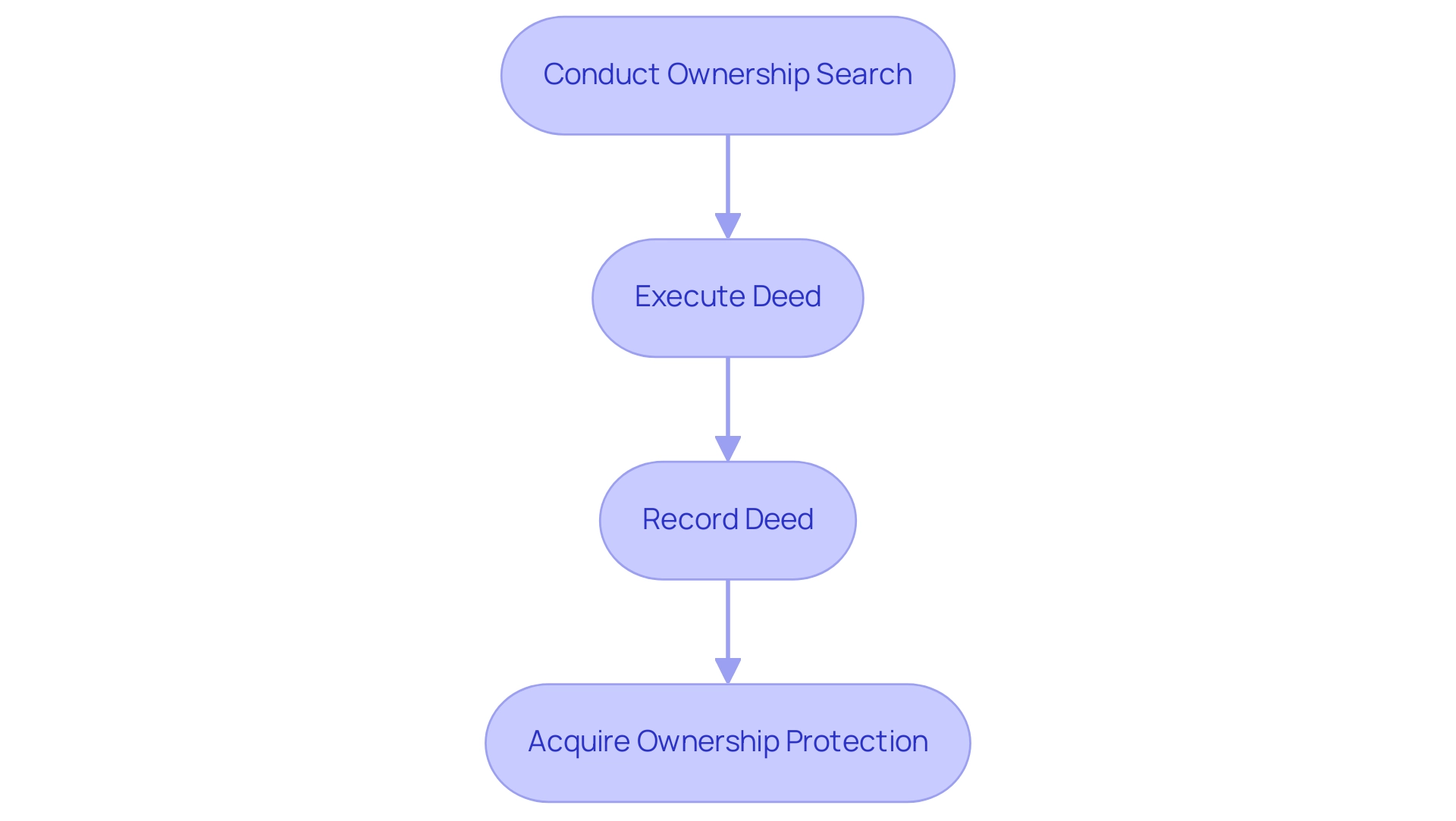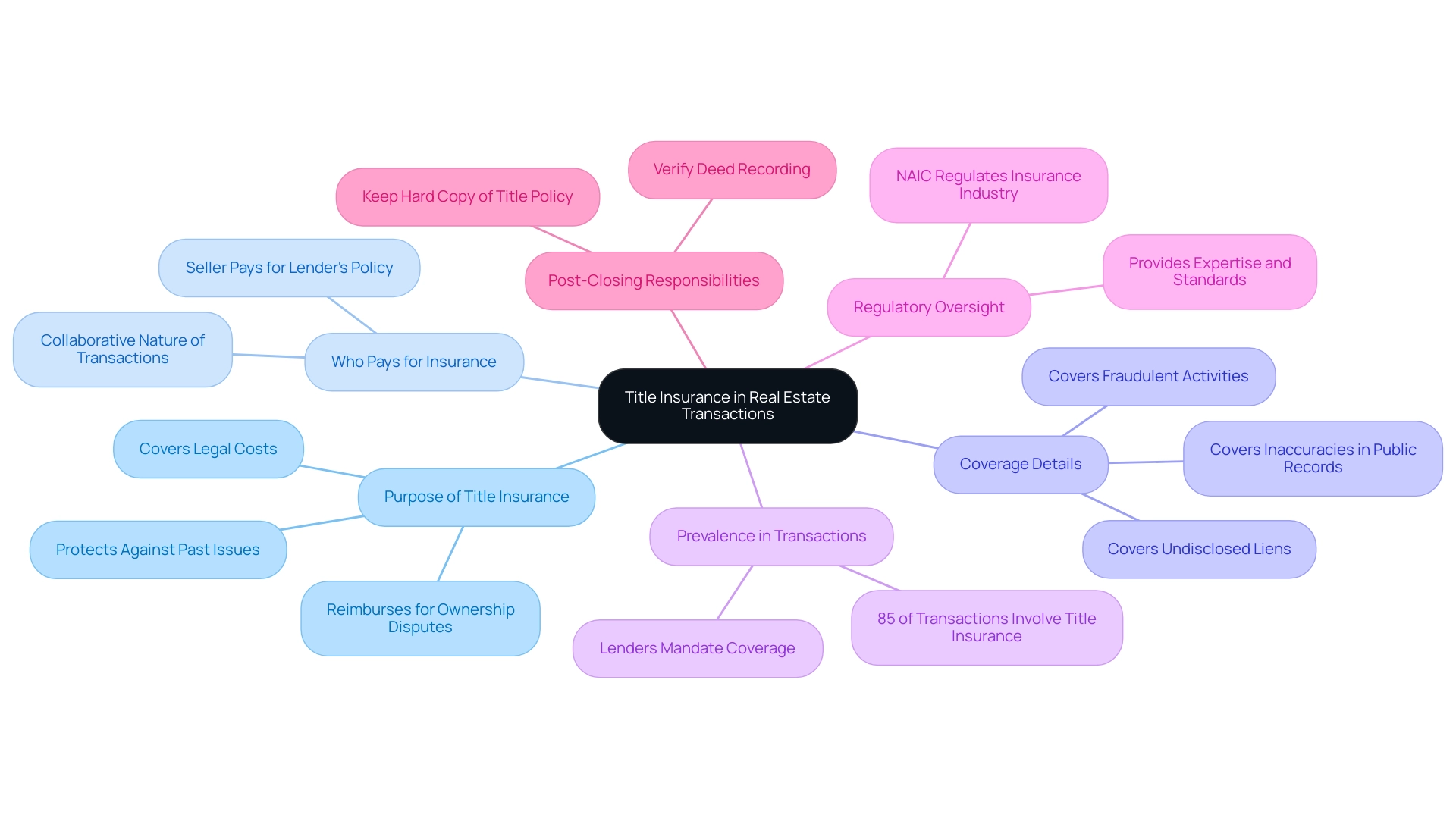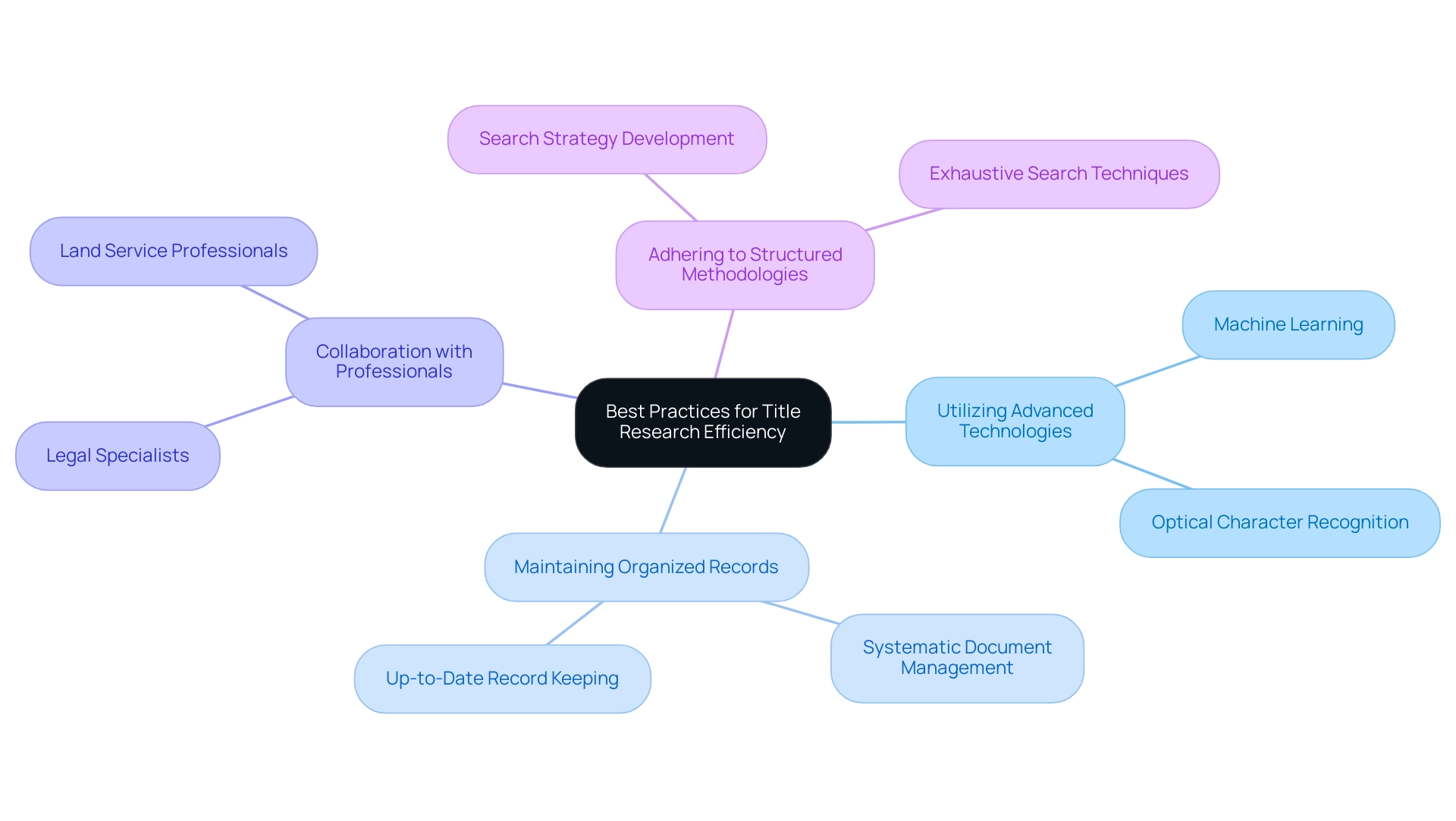Introduction
In the intricate world of real estate, housing titles stand as the cornerstone of property ownership, embodying the legal rights and responsibilities tied to a piece of land. Understanding the nuances of these vital documents is essential for professionals navigating transactions, as they provide not only proof of ownership but also crucial insights into potential claims or liens that may affect property value.
With the increasing complexity of housing title laws and the significant financial implications of inaccuracies—evidenced by billions in claims—real estate experts must adopt meticulous practices to ensure the integrity of title research.
This article delves into the multifaceted aspects of housing titles, from their definition and acquisition to the common challenges faced in ownership verification, highlighting best practices and the indispensable role of title insurance in safeguarding transactions.
Defining Housing Titles: What They Are and Why They Matter
A housing title functions as an essential legal document that expresses the possession of a property, outlining the rights linked to a particular piece of real estate, including any claims or liens that may exist. For professionals in the real estate sector, understanding the nuances of the housing title is paramount. These documents are not only essential for providing proof of possession during transactions but also play a critical role in the financing and selling processes.
Accuracy in documentation is crucial, as any discrepancies can lead to significant implications for all parties involved. Furthermore, the are crucial in resolving disputes over property ownership, ensuring clarity in rights and responsibilities. Customer reviews highlight the advantages of comparing insurance quotes from various providers, stressing the significance of thoroughness in obtaining abstractor insurance.
As evidenced by the streamlined process of obtaining abstractor insurance—where abstractors can efficiently compare quotes and secure necessary coverage—maintaining accurate and comprehensive records is integral to the integrity of real estate transactions. In light of the increasing complexity of housing ownership laws in 2024 and the rising incidents of identity theft and cyber crime, it is more important than ever for researchers to meticulously verify housing title documents. This need for accuracy is underscored by the $1.9 billion in claims paid since 2011, emphasizing the financial stakes involved in ownership accuracy.
Navigating the Practicalities of Housing Titles: Acquisition and Transfer
Acquiring and transferring is a multifaceted process, encompassing several essential steps crucial for ensuring the validity of the housing title and the absence of encumbrances. At first, potential purchasers must conduct a thorough ownership search. This critical step confirms current ownership and reveals any liens or claims attached to the property.
It often necessitates the expertise of a research specialist who can navigate the intricacies of public records. As emphasized by Rudman Winchell, their expertise has saved clients hundreds of thousands of dollars by identifying and avoiding significant errors in their businesses, highlighting the necessity of professional support in document searches. Following document verification, the next phase involves executing a deed, which serves as the legal instrument for transferring the housing title from the seller to the buyer.
This document must be signed, notarized, and recorded with the relevant governmental authority to establish its legal standing. Moreover, purchasers often choose to acquire ownership protection, a safeguard that helps secure the housing title against unforeseen claims that may arise after the transaction. Recent statistics indicate that a significant percentage of real estate transactions now include insurance for housing titles, highlighting its growing importance in the market.
As noted by Elena Metzger from Print Bangor, "We have relied on Rudman Winchell for years. They have competently and affordably helped us with everything from our business issues to helping ensure that our family is protected should anything happen." Grasping these procedural nuances is essential for real estate professionals, especially as they tackle current trends in property searches and verification while adhering to legal requirements that regulate property transactions.
Moreover, the case study on choosing a family camp lawyer demonstrates the long-term consequences of appropriate ownership transfer and the role of specialized attorneys in ensuring efficient asset transfer. As noted by industry experts, the average time to complete a document search in 2024 is projected to be streamlined, enhancing efficiency in the transaction process.

Common Challenges in Title Research and Ownership Verification
Navigating the complexities of document research presents numerous challenges that can significantly obstruct the confirmation of property rights. Statistics indicate that approximately 30% of records related to housing title contain discrepancies, highlighting the prevalence of incomplete or inconsistent information. Common obstacles include discrepancies in possession information and the intricacies of interpreting legal language.
Historical records, often poorly maintained, may leave gaps in property histories, leading to uncertainty about property rights. Furthermore, changes in property boundaries or the housing title can generate conflicting information across various documents, complicating the research process. Dr. Nikita Thattamparambil, a researcher with expertise in this field, notes that 'the precision of ownership research is paramount in ensuring rightful possession and preventing disputes.'
To address these issues effectively, a meticulous approach is essential, often involving collaboration with to ensure the accuracy of findings. Recent advancements in technology, such as machine learning and optical character recognition, have become invaluable tools for researchers, enhancing efficiency and accuracy in overcoming these challenges. By utilizing these technologies, verification methods can be significantly enhanced, ultimately resulting in more dependable outcomes.
Furthermore, case studies like the 'Procedure for ' demonstrate the significance of due process in guaranteeing fair treatment, which is essential when addressing discrepancies in property ownership records.
The Role of Title Insurance in Real Estate Transactions
The housing title protection acts as a crucial safeguard in real estate dealings, providing security to both purchasers and creditors against possible claims or flaws in the ownership. In some locations, it is customary for the seller to pay for the lender's policy, highlighting the collaborative nature of these transactions. Unlike other types of coverage, which are intended to tackle future risks, property protection specifically safeguards against problems arising from past events, such as undisclosed liens, fraudulent activities, or inaccuracies in public records.
Upon acquiring ownership protection, purchasers obtain a policy that not only covers legal costs but also reimburses for any losses resulting from ownership disputes related to the housing title. This layer of protection provides significant peace of mind, ensuring that buyers are shielded from unexpected complications that could threaten their housing title. Moreover, the National Association of Insurance Commissioners (NAIC) oversees the sector in the U.S., offering expertise and standards that enhance the credibility of real estate practices.
It is noteworthy that a substantial percentage of real estate transactions—approximately 85%—involve housing title protection, which underscores its critical role in securing financing, as lenders typically mandate this coverage as a prerequisite. Furthermore, a case study on post-closing responsibilities highlights the significance of verifying that the deed was recorded accurately in county records and keeping a hard copy of , thereby reinforcing the practical implications of property coverage. Such dynamics reinforce the significance of insurance in the real estate process, making it a fundamental element of property transactions.

Best Practices for Title Research Efficiency
To enhance efficiency in research, professionals should embrace several best practices tailored for the evolving landscape of 2024. First and foremost, utilizing advanced technologies such as machine learning and optical character recognition can dramatically expedite the extraction of information from housing titles. A recent comparison of 73 published reviews based on a structured search method showed comparable performance to 258 reviews from other Dutch academic hospitals, but with a significantly shorter development time.
These innovative tools not only automate data entry but also reduce the potential for human error, enabling researchers to allocate their efforts to . Furthermore, maintaining organized and up-to-date records is essential for effective research; a systematic approach to document management ensures that crucial information is readily accessible whenever needed. Moreover, working with legal specialists and land service professionals enhances the research endeavor, offering deeper insights into complex ownership issues and encouraging more accurate results.
As Professor Oscar Franco noted, 'The review process is critical in ensuring the reliability of research findings.' By adhering to these best practices, including those highlighted in the case study titled 'Conclusions on Search Strategy Development,' where the method allows searchers to develop confidence in their strategies, researchers focusing on housing title can significantly enhance both their efficiency and accuracy. Ultimately, this structured approach benefits the broader real estate sector in a meaningful way.

Conclusion
Understanding the complexities of housing titles is crucial for anyone involved in real estate transactions. Throughout this article, the importance of housing titles has been underscored, highlighting their role as legal documents that articulate ownership and the associated rights and responsibilities. The necessity for accurate title searches, the execution of deeds, and the significance of title insurance cannot be overstated, as these elements work in tandem to secure the integrity of property transactions.
Navigating the practicalities of acquiring and transferring housing titles involves meticulous processes that demand both expertise and attention to detail. The challenges faced in ownership verification, including discrepancies in records and historical inaccuracies, emphasize the need for collaboration with land service professionals and the adoption of advanced technologies. By leveraging these tools, real estate professionals can enhance their efficiency and accuracy, ultimately minimizing the risk of costly errors.
Moreover, title insurance emerges as a vital safeguard, protecting buyers and lenders from potential claims that could jeopardize ownership rights. As the landscape of housing title laws continues to evolve, embracing best practices in title research becomes increasingly important. By prioritizing thoroughness and accuracy, real estate experts can navigate the complexities of housing titles effectively, ensuring successful transactions and safeguarding their clients' investments. The stakes are high, and the commitment to excellence in title research is essential for fostering trust and reliability in the real estate market.
Frequently Asked Questions
What is a housing title?
A housing title is a legal document that indicates possession of a property and outlines the rights associated with it, including any claims or liens that may exist.
Why is understanding housing titles important for real estate professionals?
Understanding housing titles is crucial for real estate professionals as these documents are essential for proving possession during transactions, financing, and selling processes, and resolving disputes over property ownership.
What are the consequences of discrepancies in housing title documentation?
Discrepancies in housing title documentation can lead to significant implications for all parties involved, including potential disputes over property ownership and financial losses.
What steps are involved in acquiring and transferring housing title documents?
The process includes conducting a thorough ownership search to confirm current ownership and identify any liens, executing a deed to transfer the title, and often acquiring ownership protection to secure the title against unforeseen claims.
What role do research specialists play in the housing title process?
Research specialists help navigate public records and identify significant errors, which can save clients substantial amounts of money and ensure the accuracy of ownership searches.
How common is the use of housing title protection in real estate transactions?
Approximately 85% of real estate transactions involve housing title protection, which is increasingly important as lenders often require this coverage.
What does housing title protection cover?
Housing title protection covers legal costs and reimburses losses resulting from ownership disputes related to the housing title, protecting buyers from complications that could threaten their ownership.
What challenges do researchers face when confirming property rights?
Researchers often encounter discrepancies in records, poorly maintained historical records, changes in property boundaries, and complex legal language, which can complicate the verification process.
What technologies can improve the efficiency of housing title research?
Advanced technologies such as machine learning and optical character recognition can enhance the extraction of information, reduce human error, and expedite the research process.
What best practices should professionals follow in housing title research?
Professionals should utilize advanced technologies, maintain organized and up-to-date records, collaborate with legal specialists, and adhere to systematic approaches to enhance both efficiency and accuracy in their research efforts.




